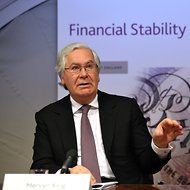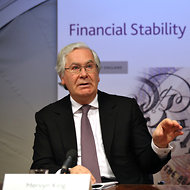 Chris Ratcliffe/Bloomberg NewsMervyn A. King, governor of the Bank of England.
Chris Ratcliffe/Bloomberg NewsMervyn A. King, governor of the Bank of England.
7:33 p.m. | Updated
LONDON — The Bank of England is calling for British banks to cut their employee compensation and shareholder dividends as a way to bolster their capital reserves in the face of sluggish earnings, tight debt markets and the European sovereign debt crisis.
The recommendation from the central bank’s Financial Policy Committee comes as British banks remain under pressure from regulators to raise capital.
“In order to boost capital, the committee concluded that dividend policies should be used actively and saw a strong case for limiting distributions to staff, although this might not be costless,” according to the minutes of the committee’s November meeting, which were released on Tuesday.
Separately, the Bank of England said on Tuesday that it would set up a new liquidity program to provide short-term loans to British banks if they are unable to obtain funding “in light of the continuing exceptional stresses in financial markets.”
“There is currently no shortage of short-term sterling liquidity in the market,” the central bank said in a statement. “But should that position change, the new facility gives the bank additional flexibility” to offer short-term loans.
Mervyn A. King, governor of the Bank of England, urged British banks last week to improve their capital reserves because the debt crisis in the euro zone was getting worse and was a threat to the stability of the banking sector. Mr. King said there were some signs of a credit crisis that could make it harder for financial institutions to obtain short-term funding.
The Financial Policy Committee said it recognized that many British banks had already reduced or suspended their dividends — and that others viewed a steady dividend as a way to attract investors and capital — but it said all banks should “build capital levels further.”
“Banks should limit distributions and give serious consideration to raising external capital in the coming months,” the committee said.
Bank pay practices have been a focus of investor anger. The Association of British Insurers, whose members manage investments that amount to about 26 percent of Britain’s total net worth, wrote letters to all publicly traded banks in Britain on Monday to ask them to “fundamentally restructure” their compensation policies.
“As bank remuneration is currently structured, our members are concerned about the level of returns that shareholders receive compared to the returns given to employees,” said one of the letters, to Standard Chartered. “The reduction in employee payout ratios needs to be achieved by reducing individual remuneration payouts to highly paid employees, including executive directors, and not by just reducing employee numbers.”
The association also said that it wanted banks to retain more capital reserves, but that this increased capital “should not be solely funded by a reduced payment of dividends.” Given the current market conditions, the insurers group expects “significantly lower bonus pools and individual awards,” the letter said.
Article source: http://feeds.nytimes.com/click.phdo?i=b8b0aba1a831aa85256dfac510f580eb
